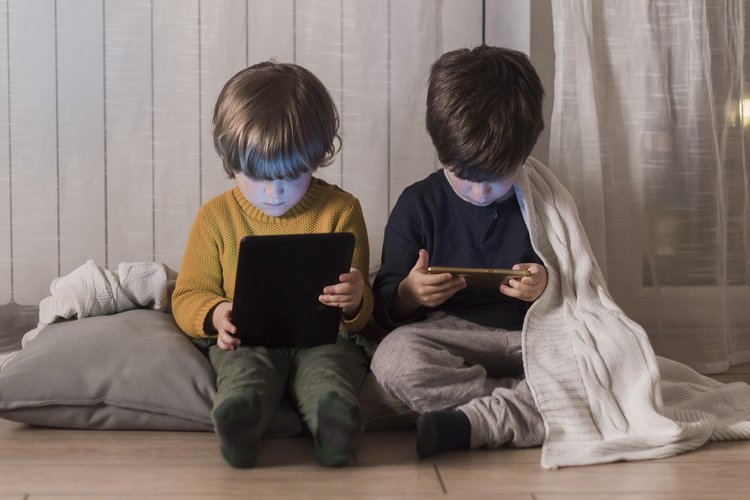How Much Is Too Much Screen Time
by Jayden Beaumont

Small children on screens are a fairly ubiquitous sight these days. Kids are getting phones at younger and younger ages, and busy parents are often quick to switch on the TV for a moment of peace and quiet. However innocent a few hours of screen time may seem, the serious and damaging consequences for children’s physical and mental health are undeniable. It’s important to understand the effects of screen time and to know what the limits should be.
The Negative Effects of Screen Time
Too much time on televisions, phones, or tablets has numerous harmful impacts on children, both physically and psychologically. According to the National Institutes of Health, children with excessive screen time have an increased likelihood of obesity as well as socioemotional problems. For example, depression, anxiety, sleep disorders, aggression, and hyperactivity are more common in children who spend a lot of time on electronic devices. A study conducted by the American Psychological Association found that young children aged 6-10 are more vulnerable to these issues.
In younger children, screen time also has troubling effects. For example, 12 to 24-month-old children who use devices for more than two hours a day are six times more likely to experience language delays—and babies under a year old who spend time on screens are even more susceptible to language development problems. Additionally, too much time on electronic devices is said to shorten attention spans and hurt focus. Children—and babies especially—need stimuli from the outside world and time to process it in order for their brains to develop. For the most part, screens are a passive form of engagement and give babies no time to learn and digest information. The best thing for a growing brain is face-to-face, two-way interactions. Similarly, children need this type of communication to learn empathy. Human interaction teaches babies to read facial expressions, body language, and social cues. Screen time can impair the development of empathy in children when it replaces time spent with family. There are certain things that children can only learn from other humans.
What Is the Right Amount of Screen Time?
The American Academy of Pediatrics recommends that babies aged 0 to 2 years should not spend any time on screens. Screen time can be extremely damaging to their developing brains. Brain scientist Patricia Kuhl found that babies under twelve months old cannot learn from a screen. The most beneficial thing for babies is interaction with people around them. The only exception the AAP makes to this zero-minute rule is for family video calls. Otherwise, you should keep your young children away from TVs and tablets.
Children aged 2 to 5 years old should spend no more than one hour on screens. By this age, kids can reap benefits from quality digital media. It’s best to have an adult present while a child is watching their TV or iPad. Parents can ask their child questions or give explanations, and generally assist learning. The parent’s job is to make sure that the child is not passively consuming content but staying engaged and focused.
It’s recommended that children older than five have no more than two hours per day of screen time. Of course, as children get older, they may have to use devices more and more for schoolwork, and this does not need to be included into their overall hours. Still, educational content is the best for your child. And even though it’s safer for older kids to spend more time on devices, they also need plenty of time to go outside and play with other kids.
Less Screen Time For the Better
Sometimes it’s easiest to hand a child a phone or turn on the TV, but limiting screen time may be the best thing to do for your kid. Not only will this protect growing brains, but it will also give your child more time to spend outside or with friends and family. In the end, restricting screen time can lead to healthier habits and stronger relationships.


